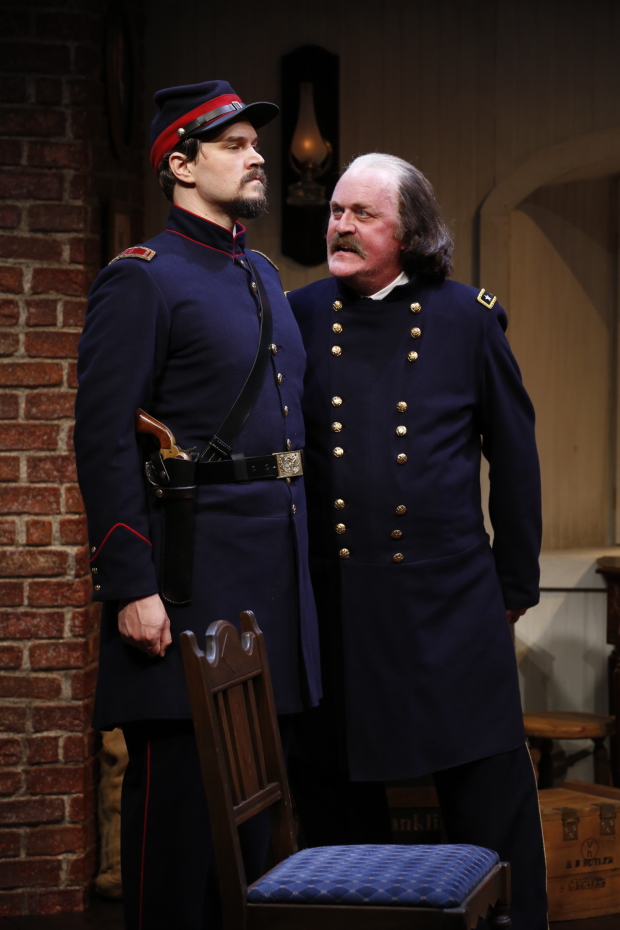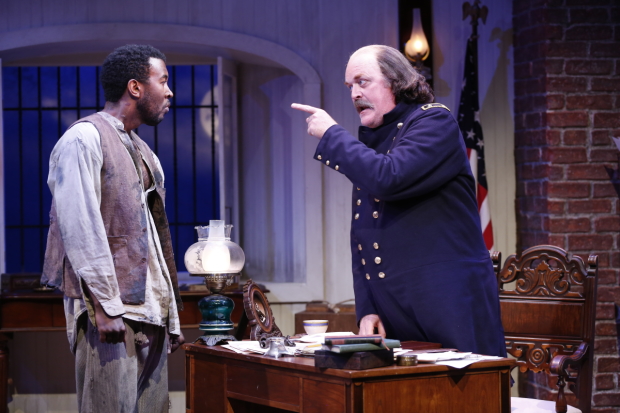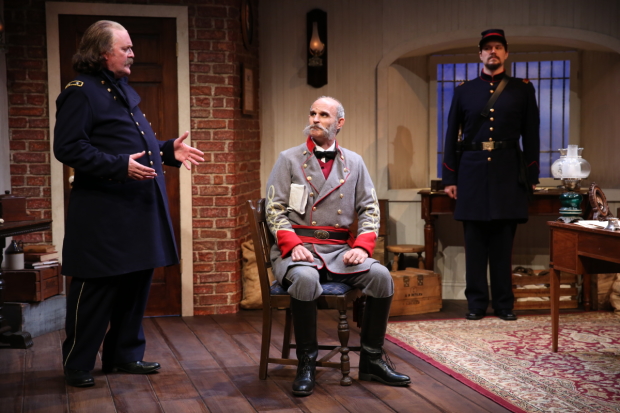Butler

(© Carol Rosegg)
Three slaves walk into a fort in Virginia. If this sounds like the setup to a twisted joke, that's because it is: Richard Strand's Butler might just be the funniest play ever written about Civil War-era slavery. Following its 2014 world premiere in New Jersey, the New Jersey Repertory Company brings the show to the city for a run at 59E59. Loosely based on the real history surrounding Fort Monroe (a Union stronghold deep in the heart of Old Dominion), Butler tackles a serious subject in a way that is simultaneously thought-provoking and sidesplitting. This is surprising considering the opening moments of the play seem to promise a very different kind of drama.
Fiddle-heavy American folk music swells (sound designer Steve Beckel instantly conjures a Ken Burns documentary) as the lights fade up on a Civil War-era military office: General Benjamin Franklin Butler (Ames Adamson, looking shockingly similar to the actual man) reads a telegram at his desk. He refuses to look up when his assistant, Lieutenant Kelly (the dashing Benjamin Sterling), enters bearing news. Butler is an attorney who has only recently been made the model of a modern major general through his political connections. Finishing the telegram, he begins to interrogate Kelly as he would a hostile witness. We understand instantly that Butler is not a very pleasant man.

(© Carol Rosegg)
Yet he may have met his match in Shepard Mallory (the fascinating and inscrutable John G. Williams), an escaped slave seeking asylum in Fort Monroe. Mallory is brash and impulsive, skittish yet mouthy. Wishing to join the Union army, he believes his secret knowledge of Confederate defenses is his key to salvation. Butler is keen to help Mallory escape, but under the Fugitive Slave Act, he is obligated to return him to the South. Confederate Major Cary (David Sitler, very much the haughty Southern gentleman) is approaching to retrieve Mallory under a banner of truce. Until then, can this Yankee general and runaway slave share a fort without driving each other crazy?
While the physical style of performance that director Joseph Discher gives this production owes much to classic sitcoms like The Odd Couple and I Love Lucy, Strand's exploration of relationships seems to hark back to something much older: Adamson and Williams, in particular, play their scenes as if they were performing Beatrice and Benedick from Shakespeare's Much Ado About Nothing. Their antipathy is complicated by the recognition of a kindred spirit, a mutual fascination that seems to magnetically draw them back into dialogue long after a conversation should have organically ceased. "I think you will regret sending me back because I think you like me," Mallory says to an increasingly red-faced Butler. Both men like to have the last word, so we understand that we may be here a while, which is fine by us since their banter is so hilarious.
Set designer Jessica L. Parks has crafted a handsome surrounding of antique furniture. A map of Virginia and a portrait of President Lincoln hang on the walls to give us an immediate sense of time and place. Crates and trunks marked "B.F. Butler" litter the hardwood floor, suggesting just how recent the general's arrival at Fort Monroe is, and how tenuous the federal tenancy is there. Patricia E. Doherty's period costumes are spot-on, especially the flamboyant embellishments on Major Cary's coat which stealthily hint at a Southern propensity for cosplay. Everyone's facial hair is magnificent.

(© Carol Rosegg)
While Butler might seem like a summertime romp in an iconic historical setting, its story is central to one of the great developments in our nation's history: The reasoning Butler concocts to protect Mallory (that he is "contraband" that could be used to aid the Confederate war machine) is the same rationale behind President Lincoln's Emancipation Proclamation, a document that only applied to states in active rebellion. It's a piecemeal approach based on slippery legal reasoning, but some progress is better than none, right? In his own humorous and very watchable way, Strand hits at a larger truth: specifically, that the arc of the moral universe is often bent toward justice by the sophistry of prickly, stubborn individuals.











